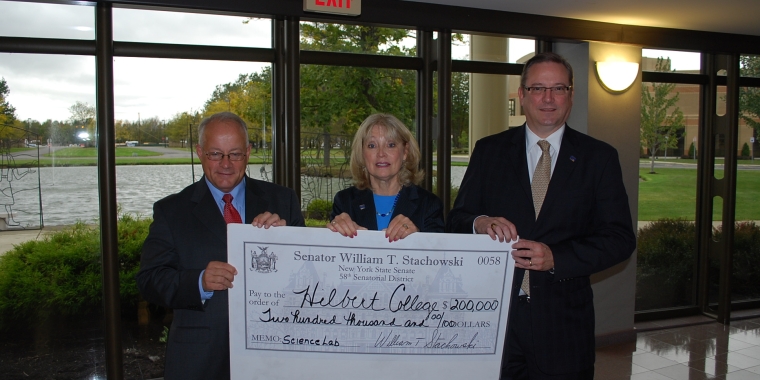Stachowski Delivers State Grant for $200,000 to Allow Hilbert College to Restore Science Labs
October 9, 2009
-
ISSUE:
- Continuing Education

For Immediate Release Contact: Dennis Kozuch
October 7, 2009 716-826-3344
senstachowski@yahoo.com
HILBERT COLLEGE TO RESTORE SCIENCE LABS
Stachowski delivers state grant for $200,000
When Cynthia Zane, the President of Hilbert College approached Senator Bill Stachowski for a state grant to help the college restore their science labs, the Senator asked who was on board with the project. When told that two prestigious foundations were involved (the James H. Cummings Foundation and the Booth Ferris Foundation), Stachowski said he would look to see what type of resources were available.
On Wednesday, October 7 Senator Stachowski announced that Hilbert College would be receiving a state grant in the amount of $200,000 for this project. "It's imperative that Hilbert bring these science laboratories up to industry standards" Stachowski said. "Students with an interest in chemistry and biology, and even other nontraditional fields, need the latest equipment and a well designed curriculum if they hope to succeed in their field. I believe this is a wise investment in these students and these programs." The total cost of the work is $750,000.
Cynthia Zane, the school's President, said that "Upgrading Hilbert’s science labs is a vital part of the college’s commitment to enhancing its academic excellence and helping students gain a better understanding of science fundamentals. We are extremely grateful to Senator Stachowski for his efforts in obtaining this grant for Hilbert."
Christopher Holoman, Hilbert’s Provost and Vice President for Academic Affairs added “State-of-the-art science labs are where students learn the basic scientific knowledge and method that is an essential part of a liberal arts education, as well as gain the more specialized knowledge now necessary in some career fields where many of our students have been successful, including forensics, criminal justice and psychology.”
"The interesting part of this project is that even students not planning on a career in a science-related field benefit from this project" the Senator said. "Most criminal justice students for instance, will not work in crime laboratories. Yet today's modern criminal investigations often revolve around scientific evidence. Likewise, as evidence is presented at trial, lawyers must be prepared to comfortably communicate with scientific experts who appear in court for the defense or prosecution. These are just a few examples -- but important ones -- for Hilbert College." Slightly over 40% of the College's students are in the criminal justice and forensic science/crime scene investigation programs and almost 7% are legal studies students.
The funds contributed by the state and the foundations will be used to purchase laboratory fixtures and equipment necessary to update the science labs.
end
Hilbert College has established a special niche in facilitating the success of first generation college students (40% of enrollment) and students who exit high school with a B/C average. More than 87% of Hilbert students qualify
for financial aid. Over the past six years, full-time enrollment has increased by 40% and the current student population is approximately 1,000 enrolled in 13 undergraduate programs. According to national student risk criteria, more than 90% of Hilbert's students are considered academically "at risk"; despite this risk Hilbert has a better than 90% job placement rate. More than 470 current students are enrolled in criminal justice, forensic science, and economic crime investigation programs with the intention of securing positions in Homeland Security, as well as many other federal and state law enforcement agencies. More than 87% of Hilbert graduates remain in the Western New York area engaging in work related to the safety and well being of their communities
